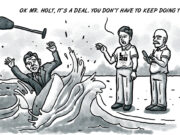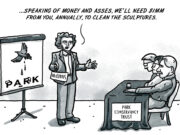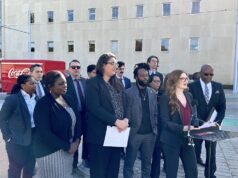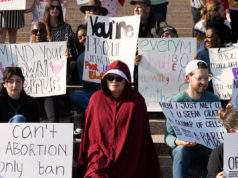
While advocacy groups, district attorneys and state legislators wrangle over “civil asset forfeiture” rules and regulations in Oklahoma, the issue may ultimately be decided through the court system. The federal court system.
Civil asset forfeiture refers to the process by which law enforcement agencies can seize money and other items. Current law in Oklahoma, and around much of the nation, allows law enforcement to seize assets under suspicion that they are related to a crime, most often drug trafficking.
But Sen. Kyle Loveless (R-Oklahoma City) filed SB 838 last year, which was not provided a hearing, meaning it remains eligible for consideration during the 2016 legislative session.
As a team of Oklahoma Watch reporters has been reporting, Loveless’s interim study request on the topic of civil asset forfeiture has been full of drama. Senate Judiciary Committee Chairman Anthony Sykes (R-Moore) scheduled the Sept. 1 meeting at the Tulsa Police Academy. After some back-and-forth concerning wi-fi, Skype and political posturing, Loveless announced he would hold his own asset forfeiture public meeting on the same day at the State Capitol.
Sykes responded by releasing a new agenda for the meeting that featured only opponents of SB 838, chiefly district attorneys around the state who use asset forfeiture regularly to pursue alleged criminals and, some people argue, pad the balance sheets of their offices and area courts.
The two meetings happened nearly simultaneously on the same day, with each side speaking on the topic some 100 miles apart, because of course they did.
I’ll let you click links and speculate which side is winning the war over public perception today.
But, months or years from today, federal courts may address this issue owing to at least one pending legal challenge on constitutional grounds in Arizona:
The Arizona American Civil Liberties Union filed a lawsuit in a U.S. District Court this morning alleging that Arizona’s Civil Asset Forfeiture laws are unconstitutional. These statutes give law enforcement agencies the power to seize personal property if they suspect it was used in criminal activity, and then either to keep it or sell it for profit.
(…)
The ACLU is hoping to get those changes made by filing suit on behalf of Sun Tan Valley resident Rhonda Cox, whose Fifth and Fourteenth Amendment rights, the group says, were violated by the civil asset forfeiture laws.
That’s right, while Loveless’s support for asset forfeiture reform is largely rooted in conservative think-tanks like the Heritage Foundation and the CATO Institute, the American Civil Liberties Union has also been a leading voice pushing for study of the topic and reform. All of those groups profess support of the U.S. Constitution, which is quite relevant here.
You’re probably most familiar with the Fifth Amendment of the U.S. Constitution as it relates to embattled television drama characters “pleading the fifth” to avoid self-incriminating testimony. But the full Fifth Amendment is robust, and a certain line is the basis for the ACLU of Arizona’s lawsuit:
“(No person shall) … be deprived of life, liberty, or property, without due process of law; nor shall private property be taken for public use, without just compensation.”
Meanwhile, the Fourteenth Amendment specifies that states may not “deprive any person of life, liberty, or property, without due process of law; nor deny to any person within its jurisdiction the equal protection of the laws.”
I’m no legal scholar, but I am literate. If law enforcement entities are systematically seizing people’s property without due process, I don’t know how the practice could hold up when challenged in court.
The ACLU of Oklahoma recently analyzed seized asset data from 12 Oklahoma counties over a five-year period and found that only $2.1 million of the $6.1 million in seized assets was from people actually charged with — not even convicted of —a crime.
Uh-oh, SpaghettiOs. Somebody get ready to cover the court challenges.
At least in court, competing sides have to present their opinions in the same room.





















